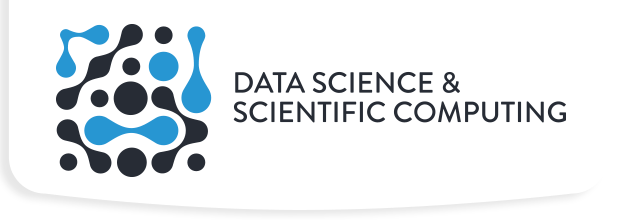The new master program in Scientific and Data Intensive Computing (class LM 44), starting from September 2023, is an international master program, taught in English, focussed on High Performance Computing, Data Engineering, Scientific Computing, Quantum Computing, with particular attention to the convergence of Machine Learning and Computer Simulation for Digital Twins. Several application areas are available, including computational mechanics, ocean and climate, computational physics and chemistry, collective adaptive systems (e.g. smart cities).
The new master program in Scientific and Data Intensive Computing is jointly organised with the University of Udine, with the participation of SISSA (International School for Advanced Studies), ICTP (International Centre for Theoretical Physics), Area Science Park (Scientific and Technologic park), INAF (National Institute of Astrophysics), and OGS (National Institute of Oceanography and Geosciences). It also features the collaboration and support of some companies.
The program is organised in three curricula:
- Computational Modeling and Digital Twins
- High Performance Computing and Data Engineering
- Quantum Computing
Admission Requirements
- academic degree, or equivalent, with a graduation grade greater or equal to 80 over 110. In the absence of a Bachelor Degree, the weighted average of the exams will be considered instead.
- obtained at least 60 ECTS in total in the following topics:
- mathematics (MAT/*)
- computer science (INF/01)
- information engineering (ING-INF/*)
- industrial engineering (ING-IND/*)
- civil engineering (ICAR/01-09)
- physics (FIS/*)
- statistics and mathematical methods for decisions (SECS-S/*)
- economy and finance (SECS-P01, 05, 08, 09, 11)
- chemistry (CHIM/*)
- molecular and genetic biology (BIO/10, 11, 18)
- geophysics and terrestrial physics (GEO/10, 12)
- among the 60 ECTS above, at least at least 21 ECTS must be obtained in maths (MAT/*, SECS-S/06)
- among the 60 ECTS above, at least at least 6 ECTS must be obtained in computer science and engineering (INF/01, ING-INF/05)
- adequate knowledge of English, certified by internationally recognized certification of level B2 or higher, or by passing a test equivalent to level B2.
Curricula
Here we will provide a brief overview of the three curricula. More details will be available soon in a dedicated website.
All curricula share a common set of core courses, giving the necessary knowledge in the areas of computer science and HPC, computational modelling, statistics and machine learning. Each curriculum has some specific core course and electives. For some courses, students have to choose between two options: typically, one course provides also introductory material (marked with * below) - for students who never studied the subject - while the other one treats more advanced topics, assuming a basic knowledge of the subject - for students that had already courses on that specific subject. Each student will have to choose one of the two courses. This will permit to assemble a personalised study plan depending on the background.
Computational Modeling and Digital Twins
This curriculum has several focusses or specialisations: Computational Mechanics, Computational Physics and Chemistry, Computational Cosmology, Discrete modelling, Computational Modelling of Ocean and Climate. More details on these specialisations (corresponding to specific choices of courses below) will be made available in the new website of the master program.
I Year
Advanced programming (*) or Software Development Methods (6 ECTS)
Introduction to High Performance Computing (6 ECTS)
Introduction to Cloud Computing (6 ECTS)
Probability and Statistics for Scientific Computing (6 ECTS)
Algorithms for Scientific Computing (*) or Advanced Algorithms for Scientific Computing (6 ECTS)
Introduction to Machine Learning (*) or Probabilistic Machine Learning or Reinforcement Learning (6 ECTS)
Deep Learning (6 ECTS)
Numerical Analysis (*) or Stochastic Modelling and Simulation or Global and Multi-Objective Optimization (6 ECTS)
Advanced Numerical Analysis or Stochastic Modelling and Simulation (6 ECTS)
Core Elective Course (group A) (6 ECTS)
II Year
Advanced Topics in Scientific Computing or Simulation Intelligence and Learning in Autonomous Systems (6 ECTS)
Core Elective Course (group A or B) (6 ECTS)
Two Elective Courses (12 ECTS)
Internship (12 ECTS)
Thesis (24 ECTS)
Core Electives - group A - each course has 6 ECTS
Modelling and Control of Cyber-Physical Systems I
Probabilistic Machine Learning
Reinforcement Learning
Mathematical Optimization
Computational Fluid Dynamics
Remote Sensing
Introduction to Astrophysics and Cosmology
Computational Physics Laboratory
Computational Quantum Chemistry
Core Electives - group B - each course has 6 ECTSPhysics and modelling of turbulence
Marine Ecosystems Modelling and Analytics
Galaxy Astrophysics
Advanced Cosmology
Statistical Thermodynamics
Image Processing in Physics
Computational Solid Mechanics
Computer Vision and Pattern Recognition
Electives - each course has 6 ECTS
All core electives not taken before
Computational Climatology
Quantitative Ecology
Information Retrieval and Data Visualisation
Advanced High Performance Computing
High Performance Computing and Data Infrastructures
Advanced Deep Learning and Kernel Methods
Data Management
Bayesian Statistics
Unsupervised Machine Learning
GPU and Parallel Programming
Machine Learning Operations
Software Development Methods
Modelling and Control of Cyber-Physical Systems II
Artificial Intelligence for Cyber-Physical Systems
Numerical Methods in Quantum Mechanics
Radiative Processes
Environmental Fluid Mechanics
Molecular Simulation
Computational Methods in Particle Physics
High Performance Computing and Data Engineering
This curriculum has two focusses or specialisations: HPC and Data Engineering. More details on these specialisations (corresponding to specific choices of courses below) will be made available in the new website of the master program.
I Year
Advanced programming (*) or Software Development Methods (6 ECTS)
Introduction to High Performance Computing (6 ECTS)
Introduction to Cloud Computing (6 ECTS)
Probability and Statistics for Scientific Computing (6 ECTS)
Algorithms for Scientific Computing (*) or Advanced Algorithms for Scientific Computing (6 ECTS)
Introduction to Machine Learning (*) or Unsupervised Machine Learning (6 ECTS)
Deep Learning (6 ECTS)
Numerical Analysis (*) or Probabilistic Machine Learning or Mathematical Optimization (6 ECTS)
Mathematical Optimization or Advanced High Performance Computing (6 ECTS)
Data Management (*) or Advanced Data Management (6 ECTS)
II Year
High Performance Computing and Data Infrastructures (6 ECTS)
Core Elective Course (6 ECTS)
Two Elective Courses (12 ECTS)
Internship (12 ECTS)
Thesis (24 ECTS)
Core Electives - each course has 6 ECTS
Advanced Data Management
Advanced Database Systems
Machine Learning Operations
Information Retrieval and Data Visualisation
Computer Vision and Pattern Recognition
Electives - each course has 6 ECTS
All core electives not taken before
GPU and Parallel Programming
Natural Language Processing
Stochastic Modelling and Simulation
Advanced Deep Learning and Kernel Methods
Artificial Intelligence for Cyber-Physical Systems
Bayesian Statistics
Explainable and Reliable Artificial Intelligence
Software Development Method
Quantum Computing
I Year
Advanced programming (*) or Software Development Methods (6 ECTS)
Introduction to High Performance Computing (6 ECTS)
Introduction to Cloud Computing (6 ECTS)
Probability and Statistics for Scientific Computing (6 ECTS)
Algorithms for Scientific Computing (*) or Advanced Algorithms for Scientific Computing (6 ECTS)
Introduction to Machine Learning (*) or Information Theory (6 ECTS)
Deep Learning (6 ECTS)
Probabilistic Machine Learning or Stochastic Modelling and Simulation (6 ECTS)
Introduction to Quantum Mechanics and Computing (6 ECTS)
Introduction to Quantum Information Theory (6 ECTS)
II Year
Two Core Elective Courses (12 ECTS)
Two Elective Courses (12 ECTS)
Internship (12 ECTS)
Thesis (24 ECTS)
Core Electives - each course has 6 ECTS
Information Theory
Quantum Algorithms
Quantum Machine Learning
Electives - each course has 6 ECTS
All core electives not taken before
Quantum Informatics and Software
Advanced Deep Learning and Kernel Methods
Data Management
Bayesian Statistics
Software Development Methods
Explainable and Reliable Artificial Intelligence

